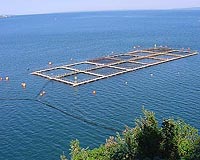 |
Athens, GA (SPX) Jan 13, 2010 Researchers at Oregon State University and the University of Georgia have developed an improved, more efficient method to test for the most serious of the parasitic worms in sheep, a problem that causes hundreds of millions of dollars in losses every year to the global sheep and wool industry. This technology is now available, and will allow a faster, easier and less expensive way to test for the presence and quantity of Haemonchus contortus, or "barber pole" worms, a species that is very pathogenic to sheep, goats and llamas. This will help sheep ranchers deal with this problem more quickly and effectively, optimize their management practices, and sometimes avoid costly therapies. Findings about the new test were just published in Veterinary Parasitology, a professional journal. "This particular parasite is much more pathogenic in sheep than other worms, and previous methods to detect it were very labor intensive and often not commercially practical," said Michael Kent, an OSU professor of microbiology. "Now ranchers and veterinarians can test for this problem and target their management or treatment strategies much more effectively." This parasite causes significant production losses, and in some cases it's the limiting factor to sheep production on pasture lands. The nematodes can cause internal bleeding, which in turn can lead to anemia, poor food conversion and growth, low protein levels, reduced lamb production and wool yield, and in some cases death. Known as the barber pole or wire worm, Haemonchus contortus is a blood-sucking parasite that pierces the lining of the sheep's stomach. It's a prolific egg producer, releasing up to 10,000 eggs per day, and often causes problems in warmer climates or during the summer. Once an infection is demonstrated, expensive treatments or complex management strategies are often needed to address it. The new lectin staining test is based on a peanut agglutinin that binds to eggs of the parasite and can be easily visualized with a microscope using ultraviolet light. It's an improved version of previous technology developed by scientists in Australia that was slower, less effective, more expensive and required more advanced training to perform, researchers say. The relatively inexpensive test was developed by microbiologists and veterinary doctors at OSU and UGA, and is now available through those institutions. Its use should continue to expand and become more readily available around the world, Kent said. The test may also be of special value to ranchers interested in organic production of sheep, goats and llamas, who try to avoid use of chemical treatments in maintaining the health of their animals. "One of the current testing tools commonly used by sheep and goat farmers in dealing with H. contortus is the FAMACHA method, in which the farmer compares the animal's lower eyelid color to swatches on a card to determine the animal's anemia status," said Bob Storey, a UGA researcher who co-developed the lectin staining test. "This method only works in situations where H. contortus is the primary parasite in a given herd's worm population. The new lectin staining test allows for a faster and less expensive method of determining the predominance of H. contortus in a herd worm population, thereby making it easier for producers to determine if FAMACHA can be a useful tool for them. Additionally, for the veterinarian dealing with an anemic animal and a heavy parasite burden, the lectin staining test provides quick feedback as to whether the anemia is parasite-based or may be due to another cause." The test requires only a small amount of feces, and results are available in as little as two days. Anyone interested in obtaining the test can get information on sampling, test results and fees from the Veterinary Diagnostic Laboratory at OSU. As with any animal health concerns, results should be reviewed with a veterinarian so that proper treatment programs can be put in place, researchers said.
Share This Article With Planet Earth
Related Links Oregon State University Farming Today - Suppliers and Technology
 Chile plans deepwater salmon farm
Chile plans deepwater salmon farm Santiago, Chile (UPI) Jan 12, 2009 Chile will launch its first deepwater salmon farming project with a Norwegian loan to try and reverse the low yields on salmon amid constant global demand. The offshore project is the brainchild of a Chilean business group that has been pledged $40 million by Norwegian banks, with the promise it can have access to more funds if the venture takes off. Disease and economic downtur ... read more |
|
| The content herein, unless otherwise known to be public domain, are Copyright 1995-2009 - SpaceDaily. AFP and UPI Wire Stories are copyright Agence France-Presse and United Press International. ESA Portal Reports are copyright European Space Agency. All NASA sourced material is public domain. Additional copyrights may apply in whole or part to other bona fide parties. Advertising does not imply endorsement,agreement or approval of any opinions, statements or information provided by SpaceDaily on any Web page published or hosted by SpaceDaily. Privacy Statement |